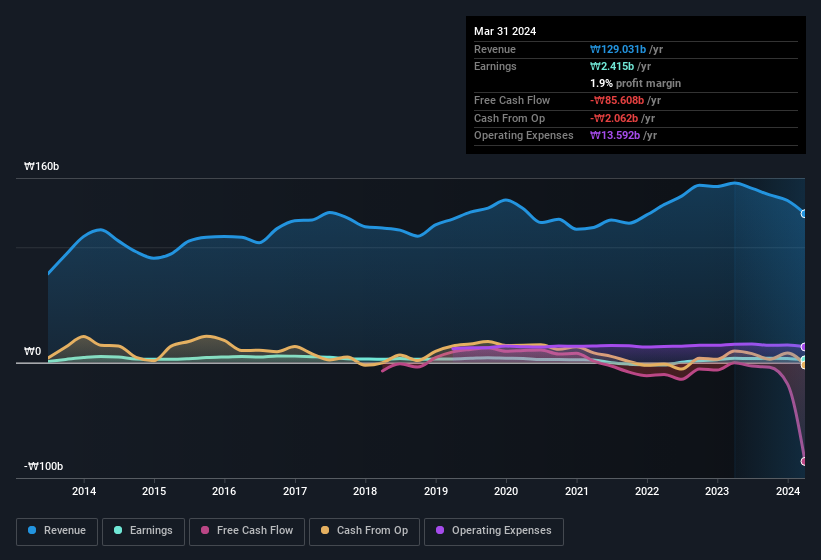- South Korea
- /
- Basic Materials
- /
- KOSE:A011390
Busan Industrial's (KRX:011390) Shareholders Have More To Worry About Than Only Soft Earnings

Busan Industrial Co., Ltd.'s (KRX:011390) stock showed strength, with investors undeterred by its weak earnings report. While shareholders may be willing to overlook soft profit numbers, we believe that they should also be taking into account some other factors which may be cause for concern.
View our latest analysis for Busan Industrial

Zooming In On Busan Industrial's Earnings
As finance nerds would already know, the accrual ratio from cashflow is a key measure for assessing how well a company's free cash flow (FCF) matches its profit. The accrual ratio subtracts the FCF from the profit for a given period, and divides the result by the average operating assets of the company over that time. The ratio shows us how much a company's profit exceeds its FCF.
That means a negative accrual ratio is a good thing, because it shows that the company is bringing in more free cash flow than its profit would suggest. While having an accrual ratio above zero is of little concern, we do think it's worth noting when a company has a relatively high accrual ratio. That's because some academic studies have suggested that high accruals ratios tend to lead to lower profit or less profit growth.
Over the twelve months to March 2024, Busan Industrial recorded an accrual ratio of 0.49. As a general rule, that bodes poorly for future profitability. And indeed, during the period the company didn't produce any free cash flow whatsoever. Over the last year it actually had negative free cash flow of ₩86b, in contrast to the aforementioned profit of ₩2.42b. Coming off the back of negative free cash flow last year, we imagine some shareholders might wonder if its cash burn of ₩86b, this year, indicates high risk.
Note: we always recommend investors check balance sheet strength. Click here to be taken to our balance sheet analysis of Busan Industrial.
Our Take On Busan Industrial's Profit Performance
As we discussed above, we think Busan Industrial's earnings were not supported by free cash flow, which might concern some investors. As a result, we think it may well be the case that Busan Industrial's underlying earnings power is lower than its statutory profit. In further bad news, its earnings per share decreased in the last year. At the end of the day, it's essential to consider more than just the factors above, if you want to understand the company properly. If you want to do dive deeper into Busan Industrial, you'd also look into what risks it is currently facing. For example, Busan Industrial has 4 warning signs (and 3 which make us uncomfortable) we think you should know about.
This note has only looked at a single factor that sheds light on the nature of Busan Industrial's profit. But there is always more to discover if you are capable of focussing your mind on minutiae. For example, many people consider a high return on equity as an indication of favorable business economics, while others like to 'follow the money' and search out stocks that insiders are buying. So you may wish to see this free collection of companies boasting high return on equity, or this list of stocks with high insider ownership.
Valuation is complex, but we're here to simplify it.
Discover if Busan Industrial might be undervalued or overvalued with our detailed analysis, featuring fair value estimates, potential risks, dividends, insider trades, and its financial condition.
Access Free AnalysisHave feedback on this article? Concerned about the content? Get in touch with us directly. Alternatively, email editorial-team (at) simplywallst.com.
This article by Simply Wall St is general in nature. We provide commentary based on historical data and analyst forecasts only using an unbiased methodology and our articles are not intended to be financial advice. It does not constitute a recommendation to buy or sell any stock, and does not take account of your objectives, or your financial situation. We aim to bring you long-term focused analysis driven by fundamental data. Note that our analysis may not factor in the latest price-sensitive company announcements or qualitative material. Simply Wall St has no position in any stocks mentioned.
About KOSE:A011390
Slight and overvalued.
Market Insights
Community Narratives



